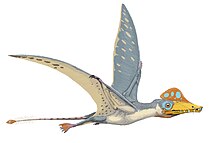Ornithocheirae
| Ornithocheirans | |
|---|---|

| |
| Skeletal cast of the species Maaradactylus spielbergi | |
| Scientific classification | |
| Domain: | Eukaryota |
| Kingdom: | Animalia |
| Phylum: | Chordata |
| Order: | †Pterosauria |
| Suborder: | †Pterodactyloidea |
| Clade: | †Ornithocheiriformes |
| Clade: | †Ornithocheirae Seeley, 1870 |
| Subgroups | |
Ornithocheirae is an extinct clade of pteranodontoid pterosaurs from the Early Cretaceous to the Late Cretaceous (Valanginian to Turonian stages) of Asia, Europe, North America and South America.[1] It was named by Harry Seeley in 1870 as a family that contains Ornithocheirus and its relatives. The name was emended to Ornithocheiridae, to match the requirements of the ICZN Code that a family-ranked clade should end with an -idae suffix. Brian Andres (2010) in his review of pterosaur phylogeny, defined the name Ornithocheirae phylogenetically, as a node-based taxon consisting of the last common ancestor of Anhanguera and Ornithocheirus and all its descendants.[2] Thus Ornithocheirae is defined to include two families, the Anhangueridae and the Ornithocheiridae, following the opinion of Alexander Kellner[3] and Andres that these families should not be synonymized based on their original phylogenetical definitions.[2] However, subsequent studies in 2019 have found Ornithocheirae to be a more inclusive group containing both Anhangueria and Targaryendraconia.
Classification
[edit]

The cladogram below is a topology recovered by Jacobs et al. (2019). Their analysis is similar to the one by Andres & Myers in 2013, though they placed more genera within the families Ornithocheiridae and Anhangueridae, including Camposipterus, Cimoliopterus, Maaradactylus and Siroccopteryx.[4]
| Ornithocheirae | |
Many recently subsequent studies have used the term Ornithocheirae for a more inclusive group, which in turn contains the smaller groups Anhangueria and Targaryendraconia.[5][6][7][8] The cladogram below shows a specific study made by Holgado and Pêgas in 2020.[9]
| Ornithocheirae | |
References
[edit]- ^ Richard J. Butler; Stephen L. Brusatte; Brian B. Andres; Roger B. J. Benson (2012). "How do geological sampling biases affect studies of morphological evolution in deep time? A case study of the Pterosauria (Reptilia: Archosauria)". Evolution. 66 (1): 147–162. doi:10.1111/j.1558-5646.2011.01415.x. PMID 22220871. S2CID 205783384.
- ^ a b Andres, Brian Blake (2010). Systematics of the Pterosauria. Yale University. p. 366. A preview that shows the cladogram without clade names
- ^ Kellner, A. W. A., (2003): Pterosaur phylogeny and comments on the evolutionary history of the group. pp. 105-137. — in Buffetaut, E. & Mazin, J.-M., (eds.): Evolution and Palaeobiology of Pterosaurs. Geological Society of London, Special Publications 217, London, 1-347
- ^ Jacobs, M.L.; Martill, D.M.; Ibrahim, N.; Longrich, N. (2019). "A new species of Coloborhynchus (Pterosauria, Ornithocheiridae) from the mid-Cretaceous of North Africa" (PDF). Cretaceous Research. 95: 77–88. doi:10.1016/j.cretres.2018.10.018. S2CID 134439172.
- ^ Borja Holgado, Rodrigo V. Pêgas, José Ignacio Canudo, Josep Fortuny, Taissa Rodrigues, Julio Company & Alexander W.A. Kellner, 2019, "On a new crested pterodactyloid from the Early Cretaceous of the Iberian Peninsula and the radiation of the clade Anhangueria", Scientific Reports 9: 4940 doi:10.1038/s41598-019-41280-4
- ^ Kellner, Alexander W. A.; Caldwell, Michael W.; Holgado, Borja; Vecchia, Fabio M. Dalla; Nohra, Roy; Sayão, Juliana M.; Currie, Philip J. (2019). "First complete pterosaur from the Afro-Arabian continent: insight into pterodactyloid diversity". Scientific Reports. 9 (1): 17875. Bibcode:2019NatSR...917875K. doi:10.1038/s41598-019-54042-z. PMC 6884559. PMID 31784545.
- ^ Pêgas, R.V., Holgado, B., Leal, M.E.C., 2019. "Targaryendraco wiedenrothi gen. nov. (Pterodactyloidea, Pteranodontoidea, Lanceodontia) and recognition of a new cosmopolitan lineage of Cretaceous toothed pterodactyloids", Historical Biology, 1–15. doi:10.1080/08912963.2019.1690482
- ^ Zhou X., Pêgas R.V., Leal M.E.C. & Bonde N. 2019. "Nurhachius luei, a new istiodactylid pterosaur (Pterosauria, Pterodactyloidea) from the Early Cretaceous Jiufotang Formation of Chaoyang City, Liaoning Province (China) and comments on the Istiodactylidae." PeerJ 7:e7688
- ^ Holgado, B.; Pêgas, R.V. (2020). "A taxonomic and phylogenetic review of the anhanguerid pterosaur group Coloborhynchinae and the new clade Tropeognathinae". Acta Palaeontologica Polonica. 65. doi:10.4202/app.00751.2020.












